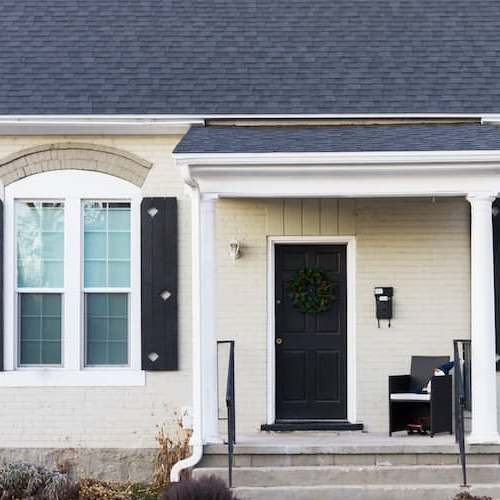A guide to the types of VA loans
Contributed by Sarah Henseler
Nov 13, 2025
•7-minute read

For most veterans and current service members, applying for a VA loan may provide a better alternative than a conventional loan. It can be a great option for qualified military members because you can enjoy more lenient credit requirements than a standard loan. Plus, most borrowers won’t need a down payment.
As of 2020, borrowers with full entitlement can get loans over $144,000 without a down payment.
But what are the types of VA loans available to you, exactly? We’ll guide you through what you’ll need to consider before you choose a VA loan. Rocket Mortgage® is a VA-approved lender, not endorsed or sponsored by the Dept. of Veterans Affairs or any government agency.
How do VA loans work?
First, it’s important to understand that the Department of Veterans Affairs (VA) itself doesn’t lend money for home mortgages – you obtain a government-backed VA loan from a bank, credit union, or online lender. The VA backs up to 25% of a VA loan, which means a lender can recover some of its loss if you default (you stop making payments on your loan). The VA backing the loan lowers the risk for lenders.
Here’s an example: $832,750 (home cost) × 0.25 = $208,187 (this is the amount the VA will back)
Why are VA loans a great option? Here are a few reasons:
- No down payment: When you buy a home with a VA loan, you’re able to finance 100% of the home’s purchase price if the lender agrees and the home's appraisal meets or exceeds the sales price. That means you won’t have to worry about saving for a home down payment.
- No private mortgage insurance (PMI): Unlike with conventional loans, you won’t have to pay for PMI if you don’t have a 20% down payment. Instead of PMI, VA loan borrowers typically pay a VA funding fee.
- Easier requirements: Lenders tend to offer more flexible credit score and financial requirements for VA loans than most mortgage options. Qualifying service members may find it easier to get approved for a VA home loan than for another mortgage type.
- Competitive interest rates: Qualifying home buyers might find that interest rates from the VA loan program are lower than those of conventional loans. A 30-year VA mortgage interest rate might be 0.25% – 0.42% lower than with a comparable conventional loan.
A VA entitlement refers to the amount the VA will guarantee on a VA loan, or the amount the VA will repay your lender if you fail to make loan payments. Your VA loan entitlement amount shows the amount you can fully borrow without making a down payment. If you’ve already used some of your entitlement with another loan, it will limit the ceiling on the home you can afford without a down payment.
What different types of VA loans are there?
You can look into different types of loans backed by the VA and we’ll help you determine the best one for you.
VA purchase loan
A VA purchase loan, also called a VA jumbo loan, is the standard mortgage type a home buyer might expect under a VA loan. A VA purchase loan allows buyers to purchase properties with no down payment. You can secure better terms with this type than you would on a conventional mortgage issued by a private lender.
Note that terms vary by individual lender, and you may have to provide a down payment with a VA jumbo loan despite the Department of Veterans Affairs not requiring one. As with most types of mortgages, a VA purchase loan gives you the option to choose an adjustable- or fixed-rate mortgage.
VA renovation loan
Borrowers can obtain funds to purchase and renovate and upgrade their home through a VA renovation loan and finance the cost of home improvements. However, not many lenders offer this loan option. Rocket Mortgage does not.
Note you can only use it for repairs or upgrades improving safety or livability – you can’t decide to renovate a kitchen because you want luxury cabinets, for example. Improvements might include replacing or adding:
- Heating and cooling systems
- Accessibility options
- New appliances
Native American Direct Loan
The Native American Direct Loan (NADL) is available to qualified service members and their surviving spouses as long as they are Native American. Eligible borrowers can use this loan to buy real estate or refinance an existing mortgage. Like other VA loans, NADL mortgages allow you to finance the full purchase price of the home with no down payment unless required by your lender. Rocket Mortgage does not offer this loan program.
Types of VA refinance loans
Qualified borrowers can also refinance their current loan with a VA loan.
VA cash-out refinance
A cash-out refinance refers to a homeowner borrowing an amount greater than their existing mortgage and replacing the old mortgage with the new one. It can be a great way to pay down other debts, fund home repairs, or pay college costs, for example. The loan will be larger, which means it will increase the loan balance. Keep in mind that refinancing may increase finance charges over the life of the loan.
Borrowers can access only 80% of their home’s equity when they get a cash-out refinance of a standard loan, but with a VA cash-out refinance, you can access 100% of your equity.
For example, let’s say your home is worth $400,000. You owe $300,000 and have $100,000 of equity in the home. If you replace your $300,000 loan with one for $350,000, you will get $50,000 in cash that you can use for whatever you want.
VA interest rate reduction refinance loan (IRRRL)
A VA interest rate reduction refinance loan (IRRRL), also called a VA Streamline Refinance1, is a type of loan that can help you achieve a lower interest rate, switch from an adjustable-rate mortgage (ARM) to a fixed-rate mortgage, or lower your monthly payment.
The benefits of IRRRLs include:
- No appraisal required
- Minimal documents
- A simplified underwriting process
- Potentially no closing costs
You must have an existing VA loan to get a Streamline.
Who qualifies for a VA loan?
The military members who qualify include:
- Active-duty, National Guard, or reserves service members
- Veterans who meet certain minimum length-of-service requirements
- Active-duty military members or veterans with disabilities connected to their service
- Surviving spouses of military service members who died while on active duty
Learn more about full VA qualifications and note that you’ll also need a Certificate of Eligibility (COE) and an appraisal of the home to ensure it meets VA standards. You can purchase a single-family home (up to four units), a condo, a manufactured home or lot, a new home, or an existing home and use the funds to improve it.
Who qualifies for a VA loan?
To obtain a VA loan, you must be one of the following:
- An active-duty, national guard or reserves service member or a veteran who meets certain minimum length-of-service requirements
- A surviving spouse of a military service member who died while on active duty
- An active-duty military member or veteran with a disability connected to your service
Keep in mind that you also need to meet your lender’s individual credit and income requirements. These requirements are set by the lender, not the VA. Also, the property you intend to purchase with the VA loan must be your primary residence, not a vacation or investment home.
You must have a certificate of eligibility
To obtain a VA loan, you’ll need a VA certificate of eligibility (COE) verifying your status as a qualifying service member or surviving spouse. You can get your COE from the Department of Veterans Affairs. Surviving spouses may face additional requirements for VA loan eligibility.
The property must meet certain requirements
Not all properties will meet VA loan eligibility requirements, regardless of the borrower’s status. A VA-approved appraiser will need to make sure the home adheres to the VA’s minimum property requirements and that its value aligns with current government-issued guidelines. If the property doesn’t appraise well, your lender may not issue you the loan.
What to know about the VA funding fee
A VA funding fee, which goes to the Department of Veterans Affairs, is a one-time payment from a veteran or service member on a VA loan. The fee is set by the government and helps lower the cost of the loan for taxpayers in the U.S.
The amount you pay on your funding fee depends on your down payment. If you don’t make a down payment, the fee is 2.15% of the purchase price on your first home loan and 3.3% of the purchase price on subsequent loans.
If you have a disability due to military service, you may be able to obtain a waiver to avoid paying the VA funding fee. Contact the Department of Veterans Affairs if you have questions about your eligibility for a VA funding fee waiver.
Typical VA funding fee amounts
Your funding fee will depend on your loan type and down payment amount. When you opt for a purchase and construction loan, your funding fees will look like the following:
|
|
Your down payment |
Your funding fee |
|
First use |
Less than 5% |
2.15% |
|
|
5% – 9.9% |
1.5% |
|
|
10% or more |
1.25% |
|
Subsequent uses |
Less than 5% |
3.3% |
|
|
5% – 9.9% |
1.5% |
|
|
10% or more |
1.25% |
For other VA loan types, you can support the VA with the following funding fees amounts:
| Your down payment | Your funding fee | |
|---|---|---|
|
First use |
Less than 5% |
2.15% |
|
|
5% – 9.9% |
1.5% |
|
|
10% or more |
1.25% |
|
Subsequent uses |
Less than 5% |
3.3% |
|
|
5% – 9.9% |
1.5% |
|
|
10% or more |
1.25% |
For other VA loan types, you can support the VA with the following funding fees amounts:
| Loan type | First use | Subsequent uses |
|---|---|---|
|
NADL Purchase |
1.25% |
1.25% |
|
NADL Refinance |
0.5% |
0.5% |
|
Cash-Out Refinancing |
2.15% |
3.3% |
Funding fee waivers are available
If you have a disability due to military service, you may be able to obtain a waiver to avoid paying the VA funding fee. Contact the Department of Veterans Affairs if you have questions about your eligibility for a VA funding fee waiver.
FAQ about different types of veteran loan programs
What are the VA loan limits?
You can check county loan limits where the property exists. The VA home loan limits are the same as the Federal Housing Finance Agency (FHFA) limits. You can check the property’s county loan limit on the FHFA website.
In addition, your lender will determine your loan size based on credit history, income, debts you may have, and assets (such as savings, retirement accounts, and investment accounts).
Which type of VA loan is right for me?
It’s a good idea to think carefully about the right type of loan for your situation. A purchase loan is for a new property, but a refinance loan can help you lower your payments.
- Purchase loans: A VA purchase loan allows buyers to purchase properties with no down payment. A VA renovation loan can help finance the cost of home improvements, and the Native American Direct Loan is available to qualified Native American service members or Native American surviving spouses.
- Refinance loans: The VA cash-out refinance means borrowing an amount greater than your existing mortgage and replacing the old mortgage with a new one. A VA interest rate reduction refinance loan can help you achieve a lower interest rate, switch from an adjustable-rate mortgage to a fixed-rate mortgage, or lower your monthly payment as long as you have a current VA loan.
Do VA loans require a down payment?
You won’t need a down payment if you have your full entitlement. If you’ve used some of your entitlement on another property and want an expensive home, you may need to offer a down payment.
Can I use a VA loan to finance any type of real estate?
You can’t finance any type of real estate you want. VA loans are for primary residences (not vacation homes). You can purchase a single-family home up to four units, a condo in a VA-approved project, a home to renovate, a manufactured home, or a new home.
The bottom line: Veterans have many options for loans
As an honored veteran, you can tap into many loan types. It’s a good idea to research all your options before you make a decision, but it’s important to know that you’ll generally benefit with potentially a no down payment loan option.
Ready to apply for a refinance or mortgage loan? Fill out your Rocket Mortgage loan application now.
1 The VA Streamline program may have stricter requirements in some states. In order to qualify for the VA Streamline program, you must have a VA loan. The VA Streamline is only available on primary residences. Cash-out transactions are not allowed. In order to qualify for a VA Streamline, a 0.5% minimum reduction in interest rate on the previous fixed-rate loan must occur if the new loan will be a fixed rate or a 2% minimum reduction in interest rate on previous adjustable rate mortgage loan must occur; a minimum of 6 months of consecutive mortgage payments must be paid on the current loan at the time of application. Some states may require an appraisal. Additional restrictions/conditions may apply.

Melissa Brock
Melissa Brock is a freelance writer and editor who writes about higher education, trading, investing, personal finance, cryptocurrency, mortgages and insurance. Melissa also writes SEO-driven blog copy for independent educational consultants and runs her website, College Money Tips, to help families navigate the college journey. She spent 12 years in the admission office at her alma mater.
Related resources

5-minute read
What is a VA adjustable-rate mortgage?
If you’re a veteran looking to buy a home, an adjustable-rate mortgage from the VA might be an affordable option. Learn more about VA-backed ARMs.
Read more

8-minute read
Buying a second home with a VA loan
VA loans are designed to help military personnel, veterans, and their families buy a primary residence, but there are ways you can use one to buy a second home.
Read more

5-minute read
FHA vs. VA loans: What's the difference, and which one is best for you?
FHA loans and VA loans can be great borrowing options for aspiring homeowners. Learn more about the differences between these two mortgage loan types.
Read more